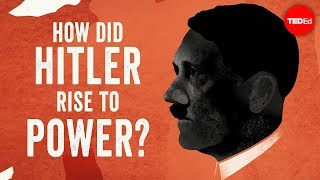(单词翻译:单击)
How did Adolf Hitler, a tyrant who orchestrated one of the largest genocides in human history, rise to power in a democratic country?
阿道夫·希特勒,一个策划了人类历史上最大规模种族屠杀的暴君,是如何逐渐掌控一个民主国家的呢?
The story begins at the end of World War I.
事情要从一战结束开始说起。
With the successful Allied advance in 1918, Germany realized the war was unwinnable and signed an armistice ending the fighting.
1918年协约国的兴起,使德国意识到无法赢得战争,便签署了停战协议。
As its imperial government collapsed, civil unrest and worker strikes spread across the nation.
随着帝国主义政府的垮台,全国各地开始内乱以及罢工。
Fearing a Communist revolution, major parties joined to suppress the uprisings, establishing the parliamentary Weimar Republic.
因为害怕共产主义革命,主要政党便联手打压这些暴动,建立魏玛共和国。
One of the new government's first tasks was implementing the peace treaty imposed by the Allies.
新政府的首要任务之一便是执行由协约国颁布的和平条款。
In addition to losing over a tenth of its territory and dismantling its army,
除了损失了十分之一的领土并解散了军队以外,
Germany had to accept full responsibility for the war and pay reparations, debilitating its already weakened economy.
德国不得不承认战争的全部责任,并需支付赔款,这对德国本就孱弱的经济来说更是雪上加霜。
All this was seen as a humiliation by many nationalists and veterans.
许多民族主义者和老兵们更视其为耻辱。
They wrongly believed the war could have been won if the army hadn't been betrayed by politicians and protesters.
他们错误地以为如果军队没有被那些政客和抗议者背叛的话,战争会胜利。
For Hitler, these views became obsession, and his bigotry and paranoid delusions led him to pin the blame on Jews.
希特勒无法摆脱这些思想,他既偏执妄想又顽固,于是把责任都怪罪到犹太人身上。
His words found resonance in a society with many anti-Semitic people.
而那些反犹主义的人也同意他的看法。
By this time, hundreds of thousands of Jews had integrated into German society,
那个时候,成百上千的犹太人虽然已经融入到德国社会,
but many Germans continued to perceive them as outsiders.
许多德国人还一直将他们视为“外来者”。
After World War I, Jewish success led to ungrounded accusations of subversion and war profiteering.
一战后,犹太人果然背上了推翻政府和在战争中投机倒把的无端罪名。
It can not be stressed enough that these conspiracy theories were born out of fear, anger, and bigotry, not fact.
必须着重强调的是,这些阴谋论都是出于恐惧、愤怒和顽固不化,而不是事实。
Nonetheless, Hitler found success with them.
尽管如此,希特勒还是逮住了机会。
When he joined a small nationalist political party,
在他加入一个小民族主义政党后,
his manipulative public speaking launched him into its leadership and drew increasingly larger crowds.
他带有操控性的公开演讲让他走上领导位置,并惹人注目。
Combining anti-Semitism with populist resentment,
利用反犹主义和民粹主义者的不满,
the Nazis denounced both Communism and Capitalism as international Jewish conspiracies to destroy Germany.
纳粹党公然抨击共产主义和资本主义都是全球犹太人企图消灭德国的阴谋。
The Nazi party was not initially popular.
纳粹党起初是不受欢迎的。

After they made an unsuccessful attempt at overthrowing the government, the party was banned, and Hitler jailed for treason.
他们企图推翻政府,但是失败了,因此被禁止,希特勒也因叛国罪而坐牢。
But upon his release about a year later, he immediately began to rebuild the movement.
但一年后,希特勒被释放了,他立即重新发起反犹运动。
And then, in 1929, the Great Depression happened.
而那时正值1929年,经济大萧条发生了。
It led to American banks withdrawing their loans from Germany, and the already struggling German economy collapsed overnight.
美国银行选择赎回借给德国的贷款,这使得颓废的德国经济瞬间崩塌。
Hitler took advantage of the people's anger, offering them convenient scapegoats and a promise to restore Germany's former greatness.
利用人们的愤怒,希特勒为他们找替罪羊,并许诺重振德国辉煌。
Mainstream parties proved unable to handle the crisis while left-wing opposition was too fragmented by internal squabbles.
主流政党无法处理这个危机,与此同时,左翼反对派也因内部矛盾而分崩离析。
And so some of the frustrated public flocked to the Nazis,
再加上绝望的人民纷纷加入纳粹,
increasing their parliamentary votes from under 3% to over 18% in just two years.
仅两年,纳粹党的国会投票便从不到3%上升至18%。
In 1932, Hitler ran for president, losing the election to decorated war hero General von Hindenburg.
1932年,希特勒竞选总统,败给了授勋的战争英雄兴登堡将军。
But with 36% of the vote, Hitler had demonstrated the extent of his support.
但36%的票数也说明希特勒有广大的支持者。
The following year, advisors and business leaders convinced Hindenburg to appoint Hitler as Chancellor,
第二年,商业领袖和顾问们说服兴登堡任命希特勒为总理,
hoping to channel his popularity for their own goals.
希望将希特勒的人气为己所用。
Though the Chancellor was only the administrative head of parliament, Hitler steadily expanded the power of his position.
尽管总理只是议会行政元首,希特勒仍然稳定的扩张自己的权力。
While his supporters formed paramilitary groups and fought protestors in streets.
而他的支持者组建议会团体,打击街头游行的抗议者。
Hitler raised fears of a Communist uprising and argued that only he could restore law and order.
希特勒对共产主义者的兴起感到担忧,并声称只有他能恢复法律和秩序。
Then in 1933, a young worker was convicted of setting fire to the parliament building.
于是1933年,国会大厦被纵火,一名年轻人被定罪。
Hitler used the event to convince the government to grant him emergency powers.
希特勒便利用这次契机说服政府给他紧急权利。
Within a matter of months, freedom of the press was abolished, other parties were disbanded, and anti-Jewish laws were passed.
仅几个月的时间,希特勒便禁止了媒体自由,废除了其他党派,并通过了反犹太人法案。
Many of Hitler's early radical supporters were arrested and executed, along with potential rivals,
许多早期支持希特勒的激进人士和潜在的对手,都遭到了逮捕并被处决,
and when President Hindenburg died in August 1934, it was clear there would be no new election.
1934年,辛登堡总统死后,不再会有新一轮的总统竞选,这一点已非常明确。
Disturbingly, many of Hitler's early measures didn't require mass repression.
令人不安的是,很多希特勒早期的举措没有遭受到大规模镇压。
His speeches exploited people's fear and ire to drive their support behind him and the Nazi party.
他的演讲利用人们的恐惧和愤怒,促使他们支持自己和纳粹党。
Meanwhile, businessmen and intellectuals, wanting to be on the right side of public opinion, endorsed Hitler.
同时,商人和知识分子,因为想要站在舆论的一边,也支持希特勒。
They assured themselves and each other that his more extreme rhetoric was only for show.
他们非常肯定的告诉自己和其他人,希特勒的极端演讲只是在表演而已。
Decades later, Hitler's rise remains a warning of how fragile democratic institutions can be
几十年后,希特勒的崛起仍然起到警钟的作用,即民主制度是多么的不堪一击
in the face of angry crowds and a leader willing to feed their anger and exploit their fears.
当面对愤怒的群众和一个散播并利用人民恐惧的领袖的时候。


